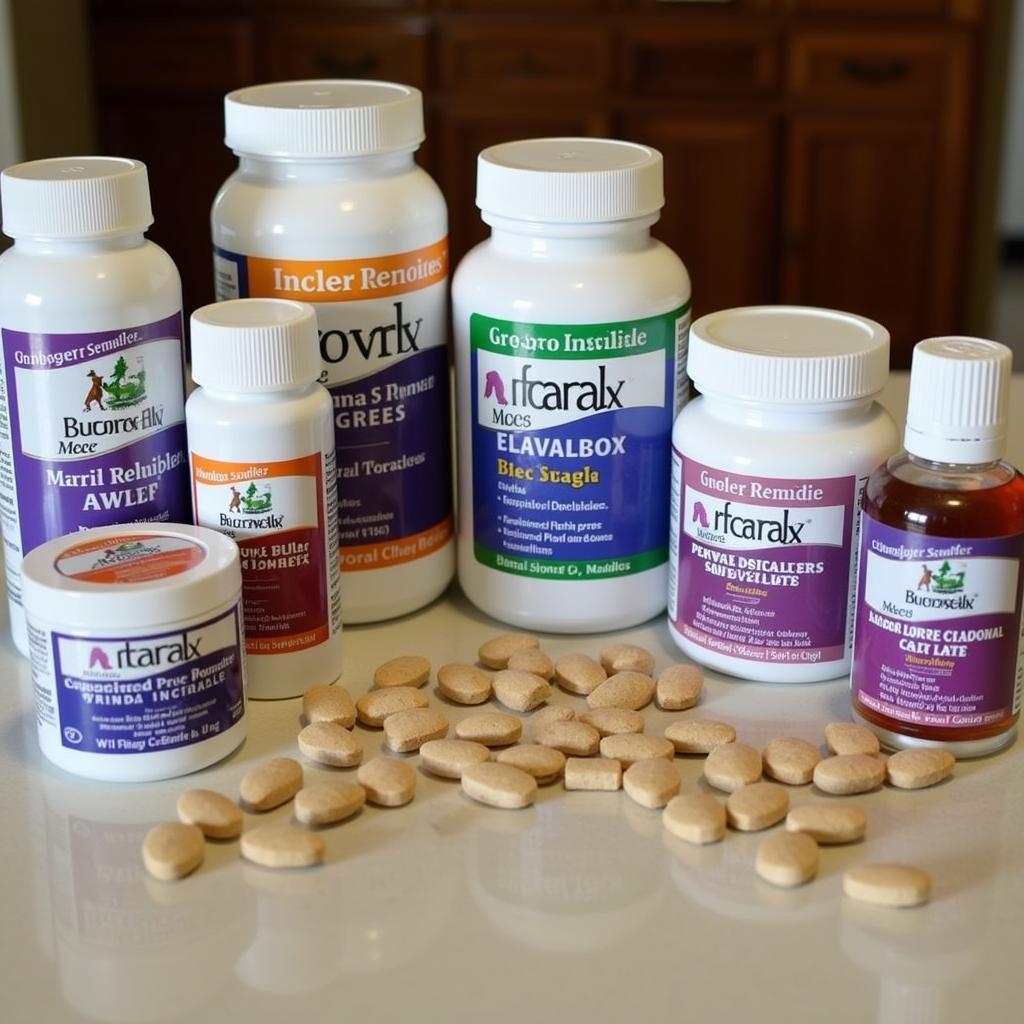Gastric ulcers are a common problem in horses, especially those involved in strenuous activities or under stress. If left untreated, these ulcers can cause discomfort, poor performance, and even colic. Choosing the best ulcer supplement for your horse is crucial for their well-being. This guide dives into the world of equine ulcer supplements, helping you understand the causes, symptoms, and ultimately, how to choose the right supplement to support your horse’s digestive health.
Understanding Gastric Ulcers in Horses
Before we explore the Best Ulcer Supplement For Horses, let’s first understand what causes these ulcers and how to recognize the symptoms.
Causes of Gastric Ulcers
The equine stomach is divided into two parts: the upper squamous portion and the lower glandular portion. The squamous portion is more prone to ulceration due to its lack of protective mucus lining. Some common factors contributing to equine gastric ulcers include:
- Stress: High-intensity training, competition, transportation, and changes in routine can increase stress levels, making horses more susceptible to ulcers.
- Diet: Feeding practices that involve long periods between meals, high-concentrate diets, and insufficient forage can disrupt the stomach’s pH balance, increasing the risk of ulcers.
- Medications: Prolonged use of non-steroidal anti-inflammatory drugs (NSAIDs) like Bute can irritate the stomach lining and contribute to ulcer development.
 Horse Showing Signs of Ulcers
Horse Showing Signs of Ulcers
Recognizing the Signs
Recognizing the signs of gastric ulcers early is vital for timely intervention. Some common symptoms include:
- Poor appetite or weight loss: A horse with ulcers may eat less or show disinterest in food, leading to weight loss.
- Behavioral changes: Increased irritability, teeth grinding, and a dull demeanor can be indicative of discomfort caused by ulcers.
- Poor performance: Decreased stamina, reluctance to work, and behavioral issues during training may point to ulcer-related discomfort.
- Colic symptoms: In severe cases, ulcers can cause colic, manifesting as pawing, rolling, and signs of abdominal pain.
Choosing the Best Ulcer Supplement for Horses
When it comes to choosing the best ulcer supplement for horses, numerous options are available, each with its own set of ingredients and benefits.
Common Ingredients and Their Benefits
- Sucralfate: This medication forms a protective barrier over the stomach lining, shielding it from stomach acid and promoting healing.
- H2 Blockers: These medications, such as ranitidine and famotidine, reduce acid production in the stomach, providing relief from ulcer discomfort.
- Proton Pump Inhibitors: PPIs like omeprazole are highly effective in suppressing stomach acid production, creating an optimal environment for ulcer healing.
- Antacids: Antacids like calcium carbonate and magnesium hydroxide work by neutralizing stomach acid, providing quick relief from heartburn and discomfort.
- Probiotics: Probiotics introduce beneficial bacteria into the gut, aiding digestion and supporting overall gut health.
- Seaweed: Certain types of seaweed, like brown seaweed, have been found to have gastroprotective properties and can help soothe the stomach lining.
Factors to Consider When Choosing a Supplement
- Severity of Ulcers: The severity of your horse’s ulcers will determine the most appropriate supplement. For mild cases, natural remedies like aloe vera or slippery elm may be sufficient.
- Your Veterinarian’s Recommendation: Always consult your veterinarian for a proper diagnosis and treatment plan. They can advise on the best ulcer supplement based on your horse’s specific needs.
- Ingredients and Dosage: Carefully review the ingredients list and recommended dosage of any supplement before administering it to your horse.
- Horse’s Age and Health Status: Consider your horse’s age, health status, and any existing medical conditions when selecting a supplement.
 Various Horse Ulcer Supplements
Various Horse Ulcer Supplements
Beyond Supplements: Management and Prevention
While supplements play a vital role in managing and preventing gastric ulcers, implementing comprehensive management strategies is equally important.
Dietary Management
- Maximize Forage Intake: Provide free-choice access to hay or pasture to encourage saliva production, which acts as a natural buffer against stomach acid.
- Reduce Concentrate Meals: Limit high-concentrate meals and instead opt for smaller, more frequent feedings to help regulate stomach pH.
- Consider Low-Starch Feeds: Choose low-starch feed options to minimize fermentation in the hindgut and reduce the risk of acidity.
Stress Reduction
- Minimize Environmental Stressors: Provide a stable environment with consistent routines, minimize transportation, and allow ample turnout time to reduce stress levels.
- Consider Calming Supplements: Certain calming supplements containing ingredients like chamomile or valerian root may help reduce anxiety and stress.
Frequently Asked Questions About Ulcer Supplements for Horses
Q: How long does it take for an ulcer supplement to work in horses?
A: The time it takes for an ulcer supplement to show noticeable results can vary depending on the severity of the ulcers and the specific supplement used. Some horses may experience relief from symptoms within a few days, while others may take several weeks to show improvement.
Q: Can I give my horse ulcer supplements without veterinary advice?
A: While some over-the-counter ulcer supplements are available, it’s crucial to consult with your veterinarian before administering any medication to your horse. They can accurately diagnose the problem, determine the underlying cause, and recommend the most effective treatment plan.
Q: Are there any natural alternatives to ulcer medications for horses?
A: Several natural ingredients, such as aloe vera, slippery elm, and licorice root, have soothing properties and may help manage mild cases of gastric ulcers. However, it’s essential to consult your veterinarian before using any natural remedies, as they may not be suitable for all horses or severe cases.
Q: What are the long-term effects of gastric ulcers in horses?
A: If left untreated, gastric ulcers can lead to chronic pain, weight loss, and poor performance. In severe cases, ulcers can perforate the stomach lining, causing life-threatening complications.
Q: Can ulcers recur in horses even after treatment?
A: Yes, gastric ulcers can recur, especially if the underlying causes are not addressed. Implementing preventive measures such as dietary management and stress reduction is crucial for long-term ulcer management.
Seeking Professional Help and Support
Choosing the best ulcer supplement for horses involves understanding your horse’s individual needs and consulting with your veterinarian for a tailored approach. By combining appropriate supplements with effective management strategies, you can help your horse find relief from ulcers and support their overall digestive health. Remember, early detection and intervention are key to effectively managing gastric ulcers and ensuring your equine partner’s well-being.
Need additional information about horse appetite stimulants? Check out this helpful resource: horse appetite stimulant.
For personalized guidance and support in managing your horse’s health, don’t hesitate to reach out to our expert team. Contact us at Phone Number: 0772127271, Email: [email protected], or visit us at QGM2+WX2, Vị Trung, Vị Thuỷ, Hậu Giang, Việt Nam. We offer 24/7 customer service to address all your equine needs.